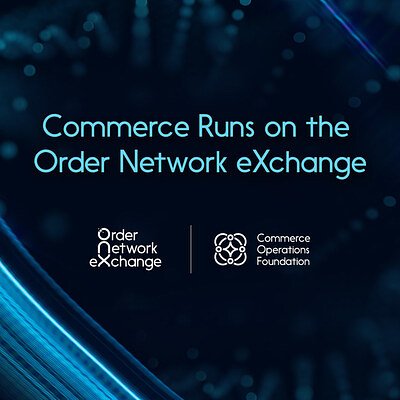
Commerce Groups Unite to Standardize Order Flows for AI-Driven Shopping
A new industry consortium aims to bridge the gap between AI-powered demand capture and fulfillment, creating a unified standard for order communication and paving the way for truly agentic commerce.
Commerce Groups Unite to Standardize Order Flows for AI-Driven Shopping
NEW YORK, NY – November 18, 2025 – A broad coalition of commerce technology providers and brands today launched the Commerce Operations Foundation (COF), a non-profit organization dedicated to establishing open standards for commerce operations. The foundation’s initial specification, the Order Network eXchange (onX), seeks to standardize how orders flow through the complex commerce fulfillment network, a critical step in enabling the next generation of AI-driven shopping experiences.
The Bottleneck in Agentic Commerce
For years, retailers and technology vendors have touted the promise of artificial intelligence transforming the shopping experience. Recent advancements, particularly in generative AI, are bringing that promise closer to reality, with AI agents capable of autonomously completing purchases on behalf of consumers. However, a significant bottleneck remains: the fragmented and often incompatible systems that handle order fulfillment.
“The front end of commerce is getting incredibly smart, but the back end hasn't kept pace,” explained one industry analyst. “AI can inspire a purchase, but if the order gets stuck in a maze of disparate systems, the customer experience suffers.”
The COF aims to solve this problem by creating a unified standard for order communication. onX, built on the Model Context Protocol (MCP), will provide a common operational language for commerce systems, enabling seamless interoperability between different platforms and partners. “We need to ensure that orders, whether initiated by a human or an AI agent, flow reliably, securely, and at scale,” stated a spokesperson for the Foundation.
Building a Unified Standard
The consortium behind the COF boasts over 62 members, collectively representing over $1 trillion in annual gross merchandise value. Founding members include major players like Manhattan Associates, IBM Sterling, SPS Commerce, and commercetools, alongside brands such as Allbirds and Ipsy. This diverse representation underscores the broad industry support for a unified standard.
“No single vendor can dominate the flow of commerce. It’s an open standard built for everyone who touches an order,” stated a source familiar with the COF’s strategy. “The goal is to create a neutral foundation that fosters innovation and benefits the entire ecosystem.”
The selection of the Model Context Protocol (MCP) as the foundation for onX is noteworthy. MCP is presented as a foundational technology for onX, enabling a common operational language for commerce systems. It is meant to unify the commerce ecosystem and ensure interoperability with future agentic commerce networks, similar to how standards like HTTP, SMTP, SMS, SWIFT, and USB-C operate for their respective domains.
Several COF members, like commercetools, are actively building solutions leveraging MCP to facilitate agentic commerce. The company has already launched Agentic Jumpstart, a solution designed to help businesses accelerate growth in AI-powered commerce channels. This proactive engagement suggests a commitment to building a robust and scalable agentic commerce ecosystem.
Implications for the Future of Commerce
The launch of the COF and onX has significant implications for the future of commerce. By standardizing order fulfillment, the foundation aims to unlock the full potential of AI-driven shopping experiences. This will not only benefit consumers through faster and more seamless transactions but also empower retailers and brands to optimize their operations and drive growth.
“The ability to seamlessly connect AI-powered demand capture with efficient fulfillment is a game-changer,” noted another industry expert. “It allows retailers to personalize the shopping experience at scale and respond to changing consumer preferences in real-time.”
The standardization effort could also lead to increased innovation and competition. By lowering the barriers to entry for new players, the COF aims to foster a more vibrant and dynamic commerce ecosystem.
One area of particular interest is the impact on third-party logistics (3PL) providers. Standardized order fulfillment will enable 3PLs to connect more easily with retailers and brands, streamlining operations and reducing costs. Ryder, a founding member of the COF, is well-positioned to benefit from this trend.
However, the success of the COF will depend on its ability to maintain its neutrality and ensure broad industry adoption. “It’s crucial that the foundation remains independent and avoids becoming dominated by any single vendor,” cautioned one analyst. “The goal is to create a standard that benefits everyone, not just a select few.”
The Foundation’s roadmap includes expanding onX to incorporate additional features and functionalities, such as support for different fulfillment models and integration with other commerce systems. The COF also plans to work with industry partners to develop best practices and guidelines for implementing onX.
As AI continues to reshape the commerce landscape, standardization will become increasingly important. The Commerce Operations Foundation and onX are taking a critical step towards building a more open, interoperable, and efficient commerce ecosystem for the future.
